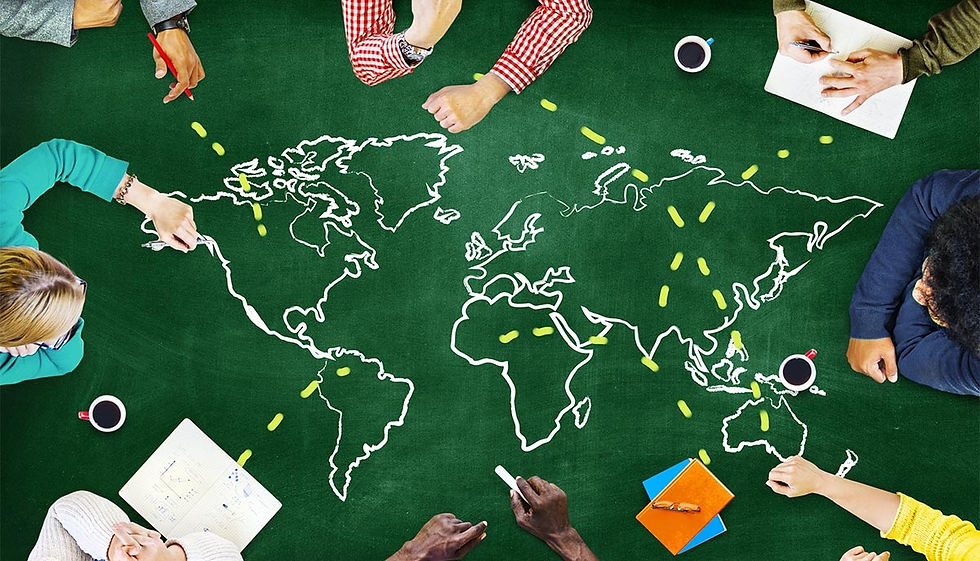Developing Globally-Minded Learners Through Sports and Education
- tysstemaces
- Aug 19
- 4 min read
Updated: Sep 2
In our interconnected world, the importance of developing globally-minded students cannot be overstated. As we face challenges that cross borders, it is essential to equip the next generation with the skills and understanding needed to thrive in a diverse environment. Sports and education play a crucial role in this development. They not only foster teamwork and discipline but also promote cultural awareness and empathy.
Here we will explore how sports and education can work cohesively for higher retention learning. We will look at specific programs, share success stories, and provide practical tips for parents and educators.
The Power of Sports in Shaping Global Citizens
Sports have a unique ability to bring people together. They create a sense of community and belonging, regardless of background. When young people participate in sports, they learn valuable life skills that extend beyond the playing field.
Building Teamwork and Collaboration
One of the most significant benefits of sports is the emphasis on teamwork. Young athletes learn to work together towards a common goal. This experience teaches them how to communicate effectively, resolve conflicts, and support one another.
For example, consider a youth soccer team. Players must pass the ball, strategize, and trust each other to win. These skills are transferable to many areas of life, including school projects and future workplaces.
Promoting Cultural Exchange
Sports also provide a platform for cultural exchange. When young athletes compete internationally, they meet peers from different backgrounds. This exposure helps them appreciate diversity and understand different perspectives.
Programs like the Special Olympics and the Youth Olympic Games encourage participation from athletes worldwide. These events foster friendships and promote inclusivity, teaching young people the value of acceptance and respect.
The Role of Education in Fostering Global Awareness
While sports are essential, education is equally important in developing globally-minded learners. Schools play a vital role in teaching students about global issues and encouraging critical thinking.
Integrating Global Issues into the Curriculum
Educators can incorporate global issues into their lessons. Topics like climate change, poverty, and human rights can be discussed in various subjects, from science to social studies.
For instance, a science class might explore the impact of pollution on different countries. This approach helps students understand how their actions affect the world and encourages them to think critically about solutions.
Encouraging Language Learning
Language learning is another crucial aspect of global education. By learning a new language, students gain insight into different cultures. It also opens doors for communication and collaboration with people from around the world.
Schools can offer language programs that focus on conversational skills and cultural understanding. This not only enhances students' language abilities but also prepares them for a globalized workforce.
Successful Research Merging Sports and Education
Several studies have shown positive outcomes from combining sports and education to develop globally-minded learners. These provide excellent examples of how to create impactful experiences.
Study 1
The Right to Play is a global organization that uses sports and play to educate and empower children. They work in disadvantaged communities, teaching life skills through sports.
Participants learn about health, education, and social issues while engaging in physical activity. This holistic approach helps children develop both physically and mentally, preparing them for future challenges.
Global Sports Mentoring Program
The Global Sports Mentoring Program connects young athletes with mentors in the sports industry. This initiative focuses on leadership development and cultural exchange.
Participants gain valuable insights into sports management, marketing, and community engagement. They also build networks that can help them in their future careers.
Practical Tips for Parents and Educators
Parents and educators can play a significant role in fostering globally-minded youth. Here are some practical tips to help guide their efforts.
Encourage Participation in Sports
Encourage children to participate in sports, whether through school teams or local clubs. This involvement helps them develop teamwork and leadership skills.
Look for programs that emphasize inclusivity and cultural exchange. These experiences can broaden their horizons and teach them about different cultures.
Promote Global Learning Opportunities
Parents can seek out educational opportunities that focus on global issues. This could include enrolling children in programs that teach about sustainability, social justice, or international relations.
Encourage discussions at home about current events and global challenges. This helps children develop critical thinking skills and a sense of responsibility towards the world.
Support Language Learning
Support your child's interest in learning a new language. This could involve enrolling them in language classes or providing resources for self-study.
Encourage them to practice their language skills with native speakers. This real-world application enhances their learning experience and builds confidence.
The Impact of Globally-Minded Learners
Developing globally-minded learners has far-reaching benefits. These young people are more likely to become compassionate leaders and engaged citizens.
Fostering Empathy and Understanding
Globally-minded youth are more empathetic. They understand the challenges faced by others and are more likely to advocate for social justice.
This empathy can lead to positive change in their communities. They may become involved in volunteer work or activism, striving to make the world a better place.
Preparing for a Global Workforce
As the world becomes more interconnected, employers seek individuals with global awareness. Youth who have participated in sports and education programs are often better prepared for the workforce.
They possess skills like teamwork, communication, and cultural competence. These attributes make them valuable assets in diverse work environments.
A Bright Future Awaits
In conclusion, developing globally-minded youth through sports and education is essential for a better future. By fostering teamwork, cultural exchange, and global awareness, we can equip the next generation with the tools they need to thrive.
Parents, educators, and communities must work together to create opportunities for young people. By doing so, we can inspire them to become compassionate leaders and engaged citizens.
Let us invest in young adults and youth today, for they are the leaders of tomorrow.



